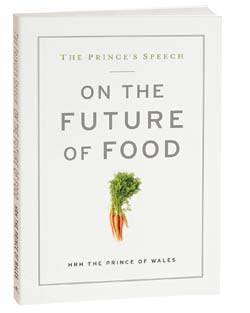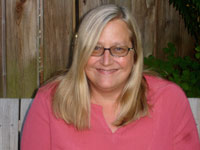The Prince’s Speech: On the Future of Food
HRH The Prince of Wales
ISBN 978-1-60961-471-3
Rodale
If you want to know what’s at stake with our ailing global food system, just listen to a farmer with calloused hands. He knows what its like to try to feed more and more hungry people while fertile farmlands turn into parking lots and subdivisions. She understands the imperative to protect and preserve non-renewable natural resources like soil and fresh water. They all struggle with dependence on fossil fuels while seeing diminishing yields of staple crops.
And if that farmer just happens to be His Royal Highness Prince Charles, The Prince of Wales, maybe the world will take notice… and take action.
“The Prince’s Speech: On the Future of Food” is a very small book that tackles the huge issue of how to fix our broken food system. At its heart is the pivotal keynote address HRH Prince Charles gave to The Future of Food conference at Georgetown University in May of 2011, put into clear context with comments from the phenomenal Wendell Berry, author and journalist Eric Schlosser, and Growing Power, Inc.’s “Farmer-in-Chief” Will Allen.
For over thirty years, HRH Prince Charles has been speaking up about the future of food with “…all the scars to prove it.” Back in 1985, he converted his Highgrove farms to organic, wildlife friendly practices and has been tireless in his efforts to spread the word about the vital need for a sustainable food system, which he defines as one that “maintains the resilience of the entire ecosystem.”
“We are going to have to take some very brave steps,” he says. “We will have to develop much more sustainable or durable forms of food production because the ways we have done things up to now are no longer as viable as they once appeared to be.” As it stands today, HRH believes “… in one way or another, half the world finds itself on the wrong side of the food equation,” with over a billion people hungry, a billion people lacking essential nutrition, and over a billion people overweight or obese.
And if you think things are bad now, just wait until 2050 when it is estimated over 9 billion more people will be crowding the dinner table. For answers, HRH cites a United Nations’ study that deserves more attention: Agriculture at a Crossroads – International Assessment of Agricultural Knowledge, Science and Technology for Development. “The report drew on evidence from more than 400 scientists worldwide and concluded that small-scale, family-based farming systems, adopting so-called agro-ecological approaches, were among the most productive systems in developing countries,” he said. “This was a major study and a very explicit statement. And yet, for some strange reason, the conclusions of this exhaustive report seem to have vanished without trace. This is the heart of the problem, it seems to me – why it is that an industrialized system, deeply dependent on fossil fuels and chemical treatments, is promoted as viable, while a much less damaging one is rubbished and condemned as unfit for purpose?”
He cautions, “We need to include in the bottom line the true costs of food production – the true financial costs and the true costs to the Earth.” HRH calls this “Accounting for Sustainability.” “The point, surely, is to achieve a situation where the production of healthier food is rewarded and becomes more affordable and the Earth’s (natural) capital is not so eroded.”
“The Prince’s Speech: On the Future of Food” has gotten a lot of attention among the choir that often sings about sustainability. Here’s several links to some of their wise thoughts about this topic and this book:
The Aspen Institute also offers a video discussion on the book, featuring Applegate Farms Founder and CEO Stephen McDonnell, Founding Director of the Johns Hopkins Center for a Livable Future Robert Lawrence, MD, and President of Slow Food USA Josh Viertel.
Are you hungry for more? Start by reading this little book, and passing it along to your friends. Watch the speech by yourself or with a crowd. And when you’re ready, lets all take action to help safeguard the future of our food.
With family roots in the fertile Red River Valley of North Dakota, Lynn Torrance Redlin has been part of the Cooking Up a Story team for a number of years. An avid gardener and home cook, Redlin is also a voracious reader, and enjoys exploring new information and ideas about our food system.


